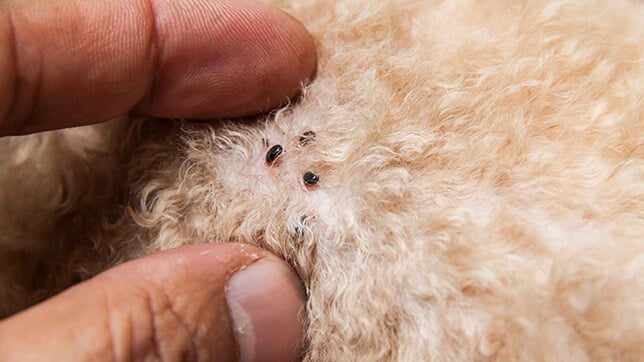6th October 2016
As a pet owner, it is important to understand what happens if your dog catches fleas and how you can prevent this from happening in the first place.
Unfortunately, it’s a situation that many dog owners have been in and it’s not uncommon for your dog to pick up the pests when they’re on their daily walk.
Not only can fleas cause irritation for your pet, but they can also cause an infestation around your home that can be hard to get rid of.
We’ve put together our guide about fleas in dogs, including how to recognise if your pet is being affected and how to remove them:

What are fleas?
Fleas are small, jumping insects that thrive (and live!) on the blood of animals. This means that they can be found on cats, dogs, rodents, rabbits and also foxes.
Despite fleas not being equipped with wings for transportation, they have amazing jumping power. They can actually jump 100 times their height thanks to their powerful hind legs!
Although fleas don’t cause major health issues to humans when they’re bitten – other than itchiness, the creatures can pass on diseases through their bite.
Where do dogs get fleas from?
No matter how adventurous your dog likes to get when they’re out and about, they are bound to wander into an area with exposure to fleas – no matter how hard you try to avoid it!
Outdoor areas are the primary place where your dog could get fleas, with large gardens, kennels and areas of wildlife being just a handful of places where your pet could pick up the pests.
As surprising as it sounds, your pet could also be getting fleas from your home environment! Because fleas jump and attach themselves to items, you could pick up the parasite from outdoors and bring it within your home on your clothing or shoes, which could quickly turn into an infestation.
Are fleas harmful to my dog?
It’s very important to prevent an infestation of fleas on your dog as it could cause health problems, such as:
Flea-Bite Anaemia
Just like humans, animals need red blood cells to keep their bodily functions running healthily. Any dog can develop flea-bite induced anaemia as a result of excessive flea bites as their red blood cells are being taken by the flea.
Tapeworm
Because fleas can be infected with the tapeworm infection, your dog could also be affected by the parasite if they lay eggs in your pets’ small intestine.
Flea Allergies
There’s also a possibility that your dog could be allergic to fleas. This is usually noticeable if your pet displays symptoms of excessive scratching, scabs or lump on their skin and biting around the tail.
How do you prevent flea bites on dogs?
The most effective way to prevent flea bites on dogs is to use flea repellent. This can be easily placed on the back of your dog’s neck, and needs to be repeated frequently to kill off all of the newly-hatched eggs that are embedded in your pets’ fur.
There are also a number of natural ways to repel fleas. Eucalyptus trees are known to be a natural flea repellent, and can be planted in your garden to avoid fleas residing in your outside space. This is because they hate the scent that a Eucalyptus gives off and will avoid visiting areas where it is prominent.
If you suspect that your dog is suffering with flea bites, it’s important to consult your vet and use the appropriate flea repellent. We have dog insurance to protect your pet from any health issues they may face.
More on our dog blog
Read more news articles, opinion pieces, reviews and personal stories behind our dogs on our blog.
Need dog insurance?
Dog insurance can help cover the cost of veterinary treatment if your dog gets injured or falls ill.
We know pets
Our pets are part of the family. To achieve our vision of a better future for pets everywhere, we work with our partners, vets, and other veterinary professionals who are pioneering the latest advancements in animal care. Our campaigns, articles, and events are crafted to support, educate, and celebrate pet owners, while our policies are designed to provide peace of mind at an affordable price.
Yet our policies don’t just protect against the unexpected – they have purpose, too.
Since we were founded over 25 years ago, we've provided industry-leading policies that protect the nation’s pets, while also making a difference to animal welfare and our planet. Thanks to you, our policyholders, we've donated over £9 million to more than 830 animal welfare charities and conservancies, helping to support vulnerable pets and wildlife around the world.
We’re proud to be wildly different. Are you?
